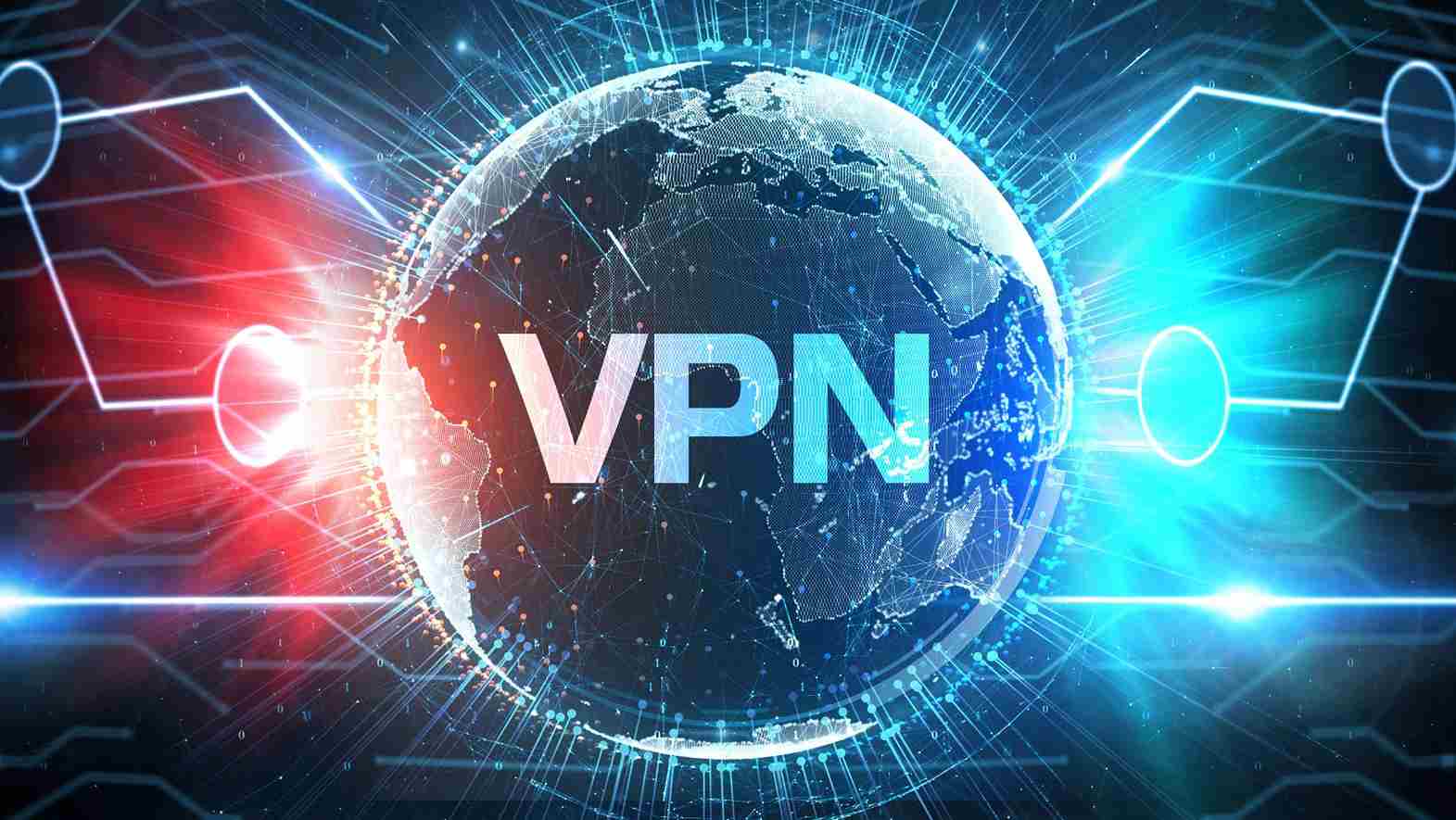Can you trust a free VPN to keep you safe? Let’s find out the best free VPN that you can download right now.
VPNs encrypt your internet connection, making it difficult for malicious entities to intercept and exploit your sensitive information. While many reputable VPN services exist, some users opt for free VPNs, enticed by the cost-saving aspect.
However, the question remains: Can you trust a free VPN to keep you safe? In this article, we will explore the best free VPN providers and the potential risks associated with using them.
List of the Best 6 Free VPN Providers
1. Proton VPN
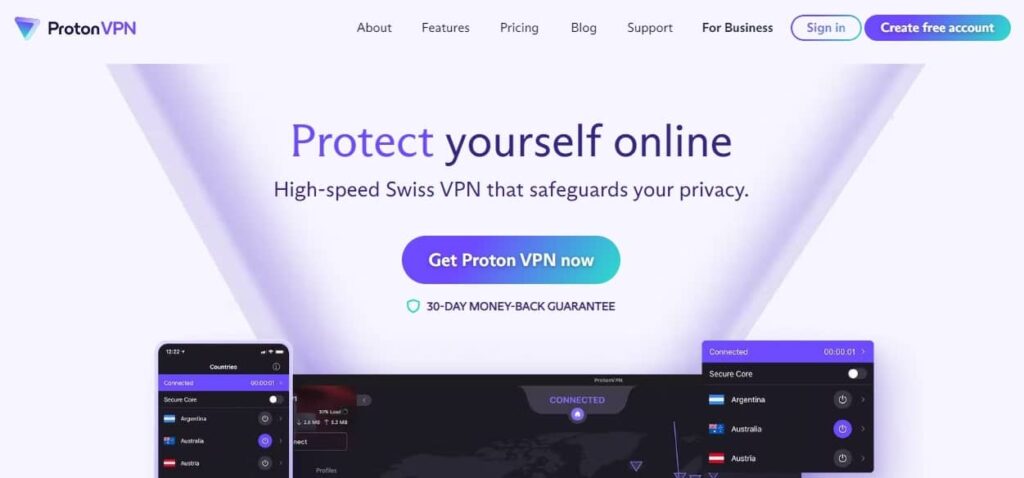
First, we’re taking a look at Proton VPN. It’s one of the most popular VPNs for a good reason. They actually offer a free VPN with unlimited data. So you’re not going to face any bandwidth caps or any crazy limitations in its fast too. They have free servers located in the United States, Japan, and the Netherlands.
Pros:
- Offers unlimited free data.
- Has servers in three countries.
- Supports multiple platforms, including Windows, Mac, Android, and iOS.
- Proton VPN outlines that they have a strict no-logs policy.
- Provides strong encryption.
- Offers a free browser extension that blocks ads and trackers.
Cons:
- The free version has a limited number of servers compared to the paid version.
- The connection speed may be slow during peak usage hours.
- You’re not able to access streaming or the built-in ad blocker.
2. Windscribe
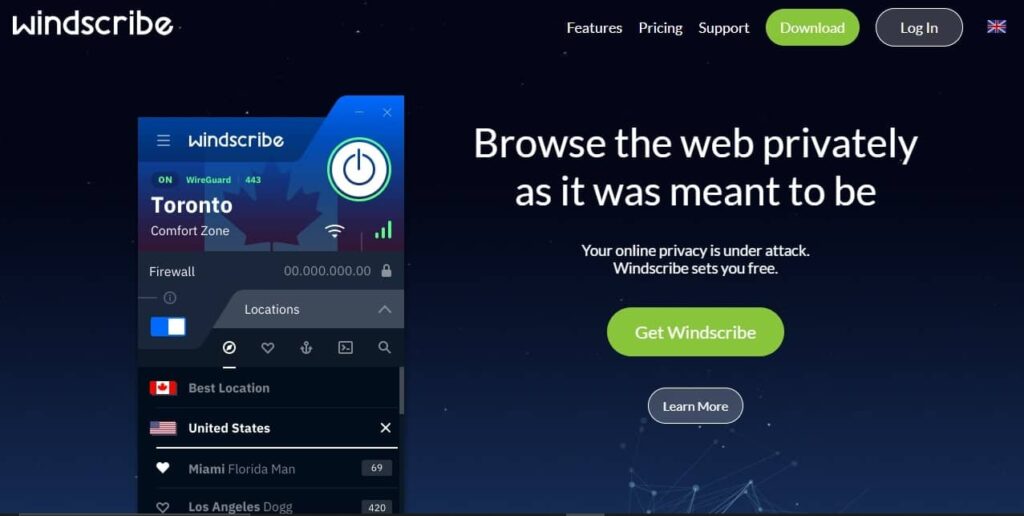
Let’s discuss the next VPN, now WindScribe is another popular option and you can get 2GB of free bandwidth per month. You can also increase that to 10GB of free bandwidth per month with a confirmed email address. There are some other ways you can get additional bandwidth added as well.
Windscribe’s free version does support streaming, I was able to stream Hulu and other services, but again with the cap of 10GB of bandwidth, you’re not going to be able to stream many shows before you run out of data. The premium version is a pretty good value.
You can get a year account for $49 and this is very competitive with other options. Windscribe has pretty good functionality too.
Pros:
- Provides 10GB of free data every month.
- Has servers in over 60 countries.
- Supports multiple platforms, including Windows, Mac, Android, and iOS.
- Offers a free browser extension that blocks ads, trackers, and malware.
Cons:
- The free version has a limited number of servers compared to the paid version.
- The connection speed may slow down during peak usage hours.
- Customer support is not available 24/7 for free users.
3. Hotspot Shield
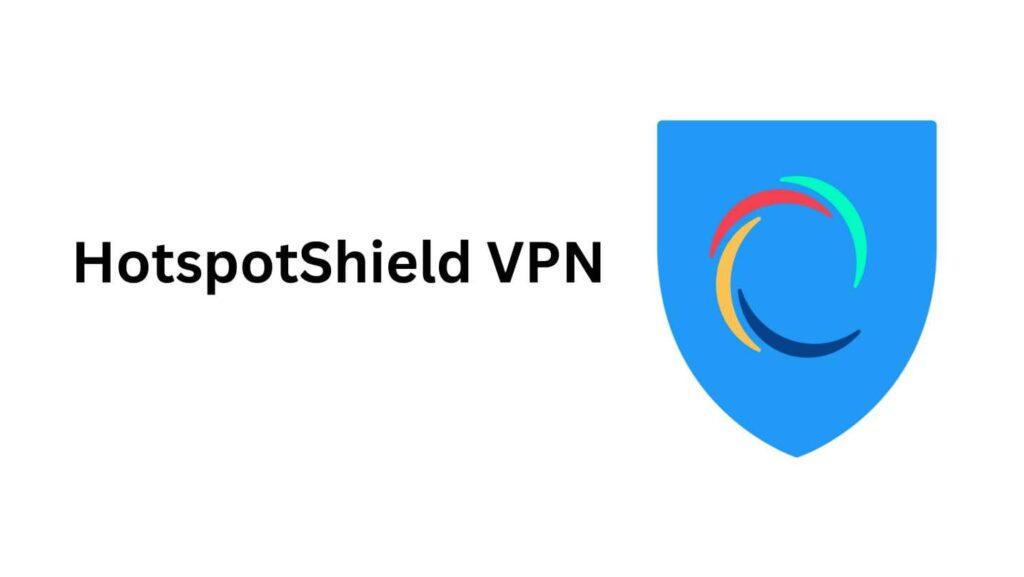
The next is Hotspot Shield. It is a freemium VPN that was recently acquired by security company Aura. Hotspot Shield Basic is throttled at 2 megabits per second down.
To clarify you are going to have the throttle speed when you use Hotspot Shield Basic. This just seemed like some sort of bug or glitch that would allow speedtest.net to test the full speed of the server without the throttle and software.
The bandwidth is supposedly capped at 500 megabytes per day, according to a support article on the Hotspot Shield website. Though the app itself had no mention of this, I was able to use it for several hours. Consecutively without getting kicked off. So I’m wondering if maybe this is an old policy that hasn’t been updated on their website.
Overall, though, Hotspot Shield Basic is just too slow to be practical for real-world use, and when the premium version is $96 a year, it’s much pricier than better options like NordVPN or Surf Shark.
Pros:
- Provides 500MB of free data per day.
- Has servers in over 70 countries.
- Supports multiple platforms, including Windows, Mac, Android, and iOS.
- Offers a user-friendly interface.
- Offers a free browser extension that blocks ads and trackers.
Cons:
- The free version has a limited amount of data compared to the paid version.
- The connection speed may slow down during peak usage hours.
- The free version displays ads.
4. Atlas VPN
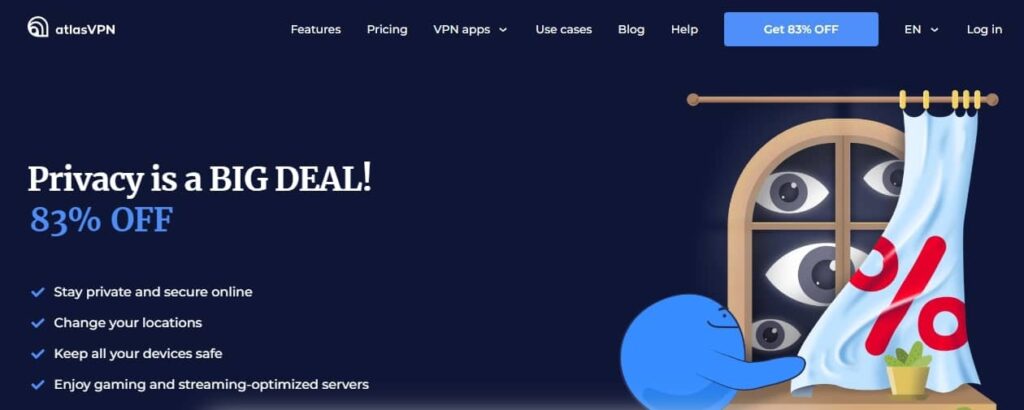
Now we’re coming to one of my favorite VPNs on the list, AtlasVPN. It is a freemium VPN that was recently acquired by NordVPN, but they are going to continue operating as an independent company when visiting its website. It’s not immediately clear that they offer a free VPN.
This is kind of funny because they branded themselves as a free VPN company, but when I look on their website there’s just a pricing page with paid plans like any other premium VPN.
However, if you download Atlas VPN, you’ll find that they do have a free version and you get access to 2GB of bandwidth per day. So. At 60GB of bandwidth per month. This is a pretty decent option.
Atlasvpn is fast too, you’ll get access to three locations, but you can’t use streaming or access to a built-in Ad blocker or other premium features. It has a strict no-logs policy that’s disclosed on its website.
might be the only VPN on this list where I think it could make sense to upgrade to their premium version. They have great service. I would feel very satisfied with the quality of their premium products at just $40 for the first year or $72 for the first three years. It’s very competitively priced.
Pros:
- It uses advanced encryption technology to keep your data safe and secure.
- The VPN service is designed to provide complete online privacy by masking your IP address and location.
- The VPN service has a user-friendly interface.
- Offers a free version with unlimited data usage.
- Has servers in over 25 countries.
- Provides strong encryption and a no-logs policy.
- Supports multiple platforms, including Windows, Mac, Android, and iOS.
- Offers a user-friendly interface and easy setup.
- Allows access to popular streaming services.
Cons:
- The free version has a limited number of servers compared to the paid version.
- The connection speed may be slow and unreliable.
- You can’t use streaming or access a built-in Ad blocker or other premium features.
- The app may not work in countries with strict internet censorship.
5. Free VPN
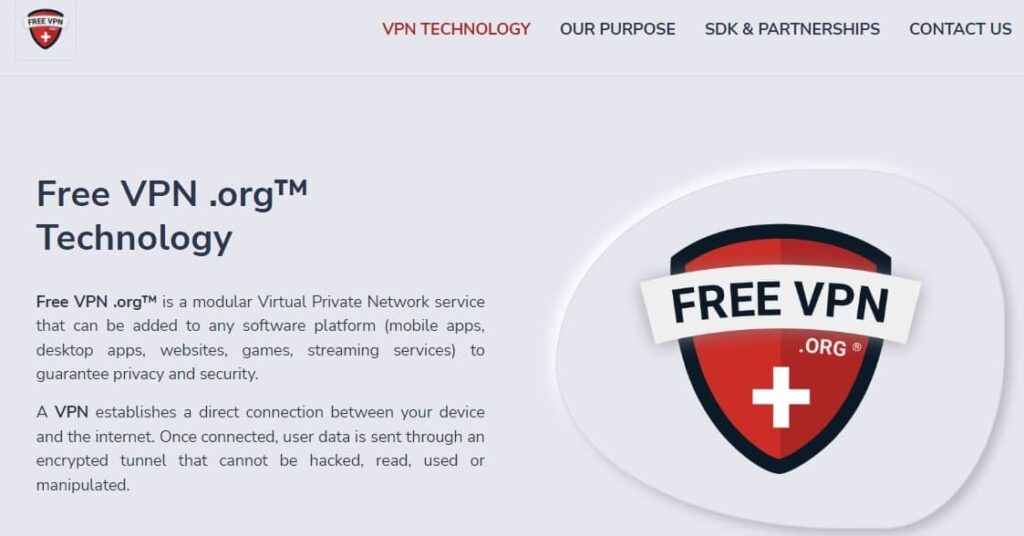
Free VPN or FreeVPN.org, I don’t know what they even call themselves, but if you search free VPN in the App Store or Play Store, chances are this is what comes up first. It’s an icon like a unicorn.
The website is very minimal. It’s kind of a thin one-pager, and they have the shortest Privacy policy I’ve ever seen on a VPN.
Pros:
- The app is free to download and use.
- Provides unlimited bandwidth and data usage.
- Supports multiple platforms, including Android, Windows, and Mac.
- Offers a user-friendly interface.
- Provides encryption and a no-logs policy.
Cons:
- The app displays ads, which can be annoying and intrusive.
- The connection speed may be slow and unreliable.
- The app may collect and sell user data to third-party advertisers.
- The app may have security vulnerabilities that could compromise user privacy.
- Customer support may be limited or non-existent.
6. TunnelBear
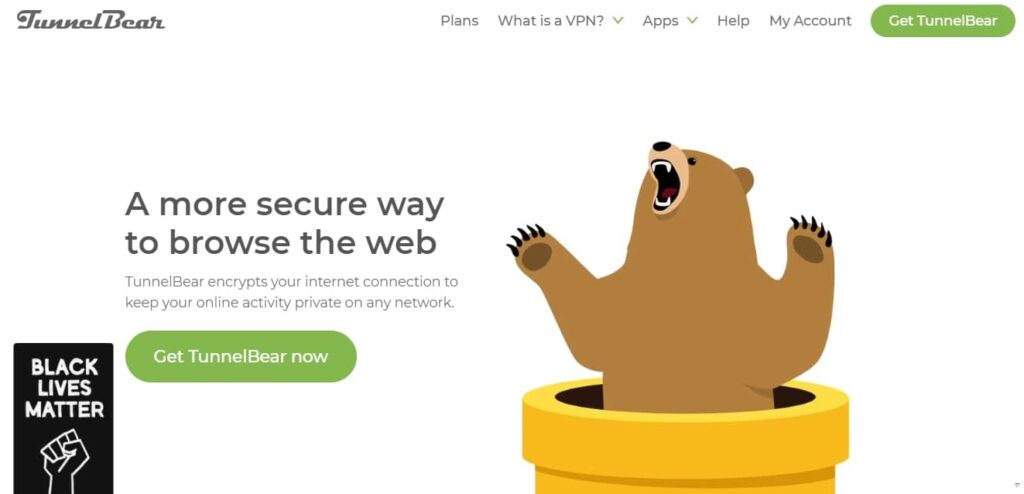
The last up is TunnelBear. It’s of Freemium VPN owned by McAfee, and McAfee is not my favorite security company, but it’s clear that they’ve allowed TunnelBear to continue to operate independently.
The Free version gives you 500 megabytes of data per month, not per day. You heard me, right per month. So honestly, there’s barely any data to do anything.
Perhaps the best thing about TunnelBear is the marketing and acute bear that greets you every time you turn on a VPN.
Pros:
- Provides 500MB of free data per month.
- Has servers in over 20 countries.
- It offers decent speed.
- Supports multiple platforms, including Windows, Mac, Android, and iOS.
- Give you access to all the features.
- Provides strong encryption and a no-logs policy.
- Offers a free browser extension that blocks ads and trackers.
Cons:
- The free version has a limited amount of data compared to the paid version.
- The connection speed may be slow during peak usage hours.
- Doesn’t support streaming, even with the premium account.
- The free version does not allow access to popular streaming services.
Conclusion
While free VPNs can be enticing due to their cost-saving nature, it’s essential to approach them with caution. Among the free VPN providers listed, ProtonVPN and AtlasVPN stand out as more reliable options with better functionality and security.
ProtonVPN offers unlimited data and fast servers, while AtlasVPN provides 2GB of data per day, making it a suitable choice for many users.
In conclusion, the above-mentioned free VPN providers can serve as reliable and secure options for protecting online privacy and security. However, it’s crucial to understand the limitations they may impose, such as data usage caps and restricted server locations.
For those seeking enhanced features and performance, investing in a reputable paid VPN service may be a more viable long-term solution.
Read More: How to Troubleshoot Common VPN Issues

